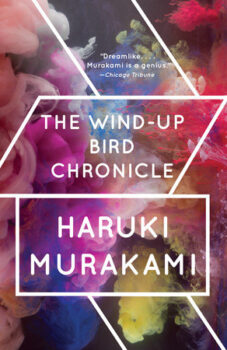 The Wind-Up Bird Chronicle by Haruki Murakami
The Wind-Up Bird Chronicle by Haruki Murakami Genres: Adult, Asian Literature, Contemporary Fiction, Historical Fiction, Japanese Literature, Magical Realism
Published by Knopf Doubleday Publishing Group on December 31, 1996
Format: Paperback
Pages: 607

Japan's most highly regarded novelist now vaults into the first ranks of international fiction writers with this heroically imaginative novel, which is at once a detective story, an account of a disintegrating marriage, and an excavation of the buried secrets of World War II.
In a Tokyo suburb a young man named Toru Okada searches for his wife's missing cat. Soon he finds himself looking for his wife as well in a netherworld that lies beneath the placid surface of Tokyo. As these searches intersect, Okada encounters a bizarre group of allies and antagonists: a psychic prostitute; a malevolent yet mediagenic politician; a cheerfully morbid sixteen-year-old-girl; and an aging war veteran who has been permanently changed by the hideous things he witnessed during Japan's forgotten campaign in Manchuria.
Gripping, prophetic, suffused with comedy and menace, The Wind-Up Bird Chronicle is a tour de force equal in scope to the masterpieces of Mishima and Pynchon.
Note: The following original review for this book is old and does not meet current review standards. A fully rewritten review is planned.
There are those who believe Murakami is a genius and artist vs those who think he is a hack. After reading two of his novels I align with the latter. While I liked The Wind-Up Bird Chronicle more than 1Q84, that’s a very low bar to pass and Wind-Up has the advantages of being 300 pages shorter and possessing a more focused collection of plot threads vs 1Q84’s introduced and completely dropped elements.
My biggest criticism of this novel and Murakami’s works in general is the excessive amount of detail and word length that’s added for no particular reason. The amount of tedious daily activities and movement by that main character adds nothing to the experience, story or characters included which is exacerbated by how repetitive and monotonous they’re written. Worse is how sporadic characters are added in, only to immediately segue into seemingly unrelated stories with no rhyme or reason. Yes there are connections between each story introduced but the execution is so lackluster, you’re just left questioning why it was done this way and what was the point of it all? The plot is thin at best, non-existent at worst and the characters are so wooden, failing to inspire any level of interest.
The main character Toru Okada is self-described (repeatedly at every possible opportunity to remind the reader) as being apathetic, forgettable and lacking of honor or drive which serves as a convenient and appropriate summary of the the entire novel itself. I found myself more interested and invested in the main “villains” (portrayed as the absolute embodiment of evil) than I did with Toru Okada who I felt half deserved the suffering he experienced; any joy I experienced from this book was purely schadenfreude. That’s a sign that something went really wrong.
